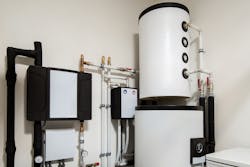Electrification is the environmental buzzword of the day. Expect more interest in electric products from environmentally-conscious consumers and more mandates away from gas by local governments. This means you can expect an increase in electric water heaters and with it, an increase in heat pump water heaters. Here are 14 things you need to know about heat pump water heaters.
1. Lower Utilities
Heat pump water heaters are considerably less expensive to operate than straight electric water heaters. This is their primary advantage.
2. Lower Carbon Footprint
Because heat pump water heaters use less electricity, they are more environmentally friendly than straight electric. A little more than 60% of the nation’s electricity is based on fossil fuel generation. Reduce electric usage and you reduce fossil fuel generation.
3. You Need Power
Typically, a heat pump water heater requires 240 volts. If you are replacing a gas water heater and do not have sufficient power available, you will need to subcontract with an electrical contractor if you do not have an electrician on staff.
4. You Need Space
Recommendations for heat pump water heaters run around one thousand square feet. In other words, you need around a 10’ by 10’ room. For basements and garage installations, you should be in good shape. As a rule, water heaters located in closets will need to be moved. If the closet is in the garage, it might be possible to simply remove the closet door.
5. There is an Ambient Temperature Range
According to the U.S. Department of Energy, heat pump water heaters need to be operated in spaces where the temperature stays above 40 deg. F and below 90 deg. F. Most basement application should be fine. Some garage may be questionable. Attic applications, like many in Texas, are questionable.
6. Free Cooling
The heat pump water heater provides some cooling. Heat pumps remove heat from the surrounding ambient air and literally use a compressor to pump the heat through refrigerant into the storage tank’s water. Removing heat results in cooler air. This is a benefit in the summer, but a small liability in the winter.
7. Free Dehumidification
When the heat pump pulls heat from the ambient air, it also squeezes out moisture. A heat pump water heater can reduce the clammy feeling of some basements.
8. You Must Drain Condensate
The moisture that the heat pump water heater squeezes out becomes condensate, which has to go somewhere. If there is not a readily available drain, adding one will need to be factored into the cost.
9. Recovery Times are Slow
If hot water recovery is limited to the heat pump alone, it will be slow (i.e., think hours). Electric resistance heat can hasten the recovery, but at the price of eliminating much of the savings. An alternative is to use a larger storage tank.
10. Heat Pump Water Heaters Make Noise
When water is heating, there is a compressor running. There is some accompanying sound. In most cases it will not be a problem, but you should be aware of it and set customer expectations accordingly.
11. Longer Life
Heat pump water heaters are projected to have a slightly longer life than conventional storage water heaters. The difference is only a couple of years, but it helps.
12. They Cost More
The primary downside to a heat pump water heater is price. The cost from the manufacturer is roughly three times the cost of a conventional storage water heater. The installed cost may range up to four times as much. Fortunately, some consumers are willing to pay significantly more to reduce ongoing utility payments, especially if they anticipate rising rates in the future. Others are willing to pay a premium to reduce their carbon footprints.
13. Incentives Offset Costs
Government officials love heat pump water heaters. Accordingly, there are federal, state, and some local incentives. For up-to-date information on government incentives, visit the DSIRE database (https://www.dsireusa.org/).
14. More Profitable for Plumbers
Installing a heat pump water heater may take the same amount of time as a storage water heater. Even if it costs more, you can price in the added labor. Because the material costs are so much higher, if you maintain your margins, your total gross profit dollars and gross profit per man hour jumps considerably, making heat pump water heaters very profitable for plumbers.
Offer the Option
It is impossible for you to tell the difference between customers who might be willing to pay a premium for a heat pump water heater from those who want the lowest first cost. Thus, they should included as an option on every water heater replacement quote. Some will want them, others will not. Yet others might select a better storage water heater because it seems low cost in comparison to the heat pump water heater. You have nothing to lose by offering the product. Offer the option and let the customer decide.
Are you growing your plumbing business? Are you making the phone ring and the applications sing. If not, you need help. Get it from the Service Roundtable. It’s plumbing’s largest and most affordable business alliance at just $50 per month without a long term contract. Learn more at www.serviceroundtable.com.
About the Author
Matt Michel
Chief Executive Officer
Matt Michel is CEO of the Service Roundtable (ServiceRoundtable.com). The Service Roundtable is an organization founded to help contractors improve their sales, marketing, operations, and profitability. The Service Nation Alliance is a part of this overall organization.
